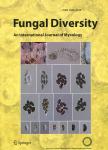Phylogeny and taxonomic revision of Thelonectria discophora(Ascomycota,Hypocreales,Nectriaceae)species complex
发展史和 Thelonectria discophora 的分类修订(Ascomycota, Hypocreales, Nectriaceae ) 种类建筑群作者机构:Department of Plant Science and Landscape ArchitectureUniversity of Maryland2112 Plant Sciences BuildingCollege ParkMD 20742USA Systematic Mycology and Microbiology LaboratoryUSDA-ARSBeltsvilleMD 20705USA Biodiversity(Mycology)Eastern Cereal and Oilseed Research CentreAgriculture and Agri-Food CanadaOttawaOntario K1A 0C6Canada Centro de Recursos Renovables de la Zona Semiarida-Cerzos ConicetUniversidad Nacional del SurCamino La Carrindanga Km7B8000FWB Bahía BlancaProvincia de Buenos AiresArgentina Escuela de BiologíaUniversidad de Costa RicaApartado11501-2060 San PedroSan JoséCosta Rica
出 版 物:《Fungal Diversity》 (真菌多样性(英文))
年 卷 期:2015年第70卷第1期
页 面:1-29页
核心收录:
学科分类:07[理学] 0701[理学-数学] 070101[理学-基础数学]
基 金:funded by a grant from United States National Science Foundation(PEET program)DEB-0925696:“Monographic Studies in the Nectriaceae Hypocreales:Nectria Cosmospora and Neonectria”to University of Maryland(P.Chaverri G.J.Samuels&A.Y.Rossman)
主 题:New species Rubus canker Species concept Taxonomy
摘 要:Specimens regarded as Thelonectria discophora(Thelonectria,Nectriaceae,Hypocreales)constitute a conspicuous group of saprobic fungi on decaying plant material,characterized by red perithecia each with a broad mammiform(nipple-like)*** asexual state is characterized by a cylindrocarpon-like morphology,with 3–5 septate macroconidia,unicellular microconidia and chlamydospores that are rarely produced in *** the past,*** was regarded as one species with a wide geographic ***,a recent study rejected the monophyly and cosmopolitan distribution of this species,and showed the existence of at least 16 cryptic species distributed in three main *** combining the results of phylogenetic analyses of six nuclear loci and morphological studies,we revised the taxonomy of the *** species complex,resulting in the description of 12 new species and four new combinations based on historic *** though molecular phylogenetic analyses strongly support the segregation of these species,and are in agreement with previous studies,individual diagnostic morphological characters for each species could not be ***,discrete morphological traits corresponding to each of the three main groups of species were *** could be differentiated based on the average values of morphological traits as well as the presence/absence of characteristic asexual propagules and colony growth at ***,illustrations are provided for the recognized species.



